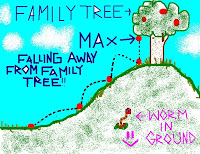
One of the funniest movies i have seen in a long time! The humor is so different then the humor in movies today. Is it because I am Jewish and the character is also Jewish, and his character i actually see his whinny sense of character as amusing because I have grown up to humor this. OR... is this another genre of comedy in itself? Annie Hall I do not think was necessarily written as a documentary of her life but of Alvy's life looking at hers. I liked seeing Annie Hall from this point of view because the story did not turn into her complaining or her frustration with her relationship but a point of view from Alvy's eye on what she was feeling.
Favorite scene and perfect representation of the kind of humor (I enjoyed) in Annie Hall:
The scene where Alvy and Annie are in the movie theatre line and this annoying guy is behind him spitting down his neck talking about his opinions of movies. And there Alvy is getting rained on and he gets so fed up that he walks to the camera and yells at the audience in frustration. This is awesome! Out of no where he breaks the story line and talks to the audience. The the best thing still come when he pulls out the director the spitting guy was analyzing out from the right side of the screen and proves the spitting guy wrong to get him to shut up. And there Alvy goes, "Don't you just wish life was like this," so honest and blunt.
- Jennifer K

